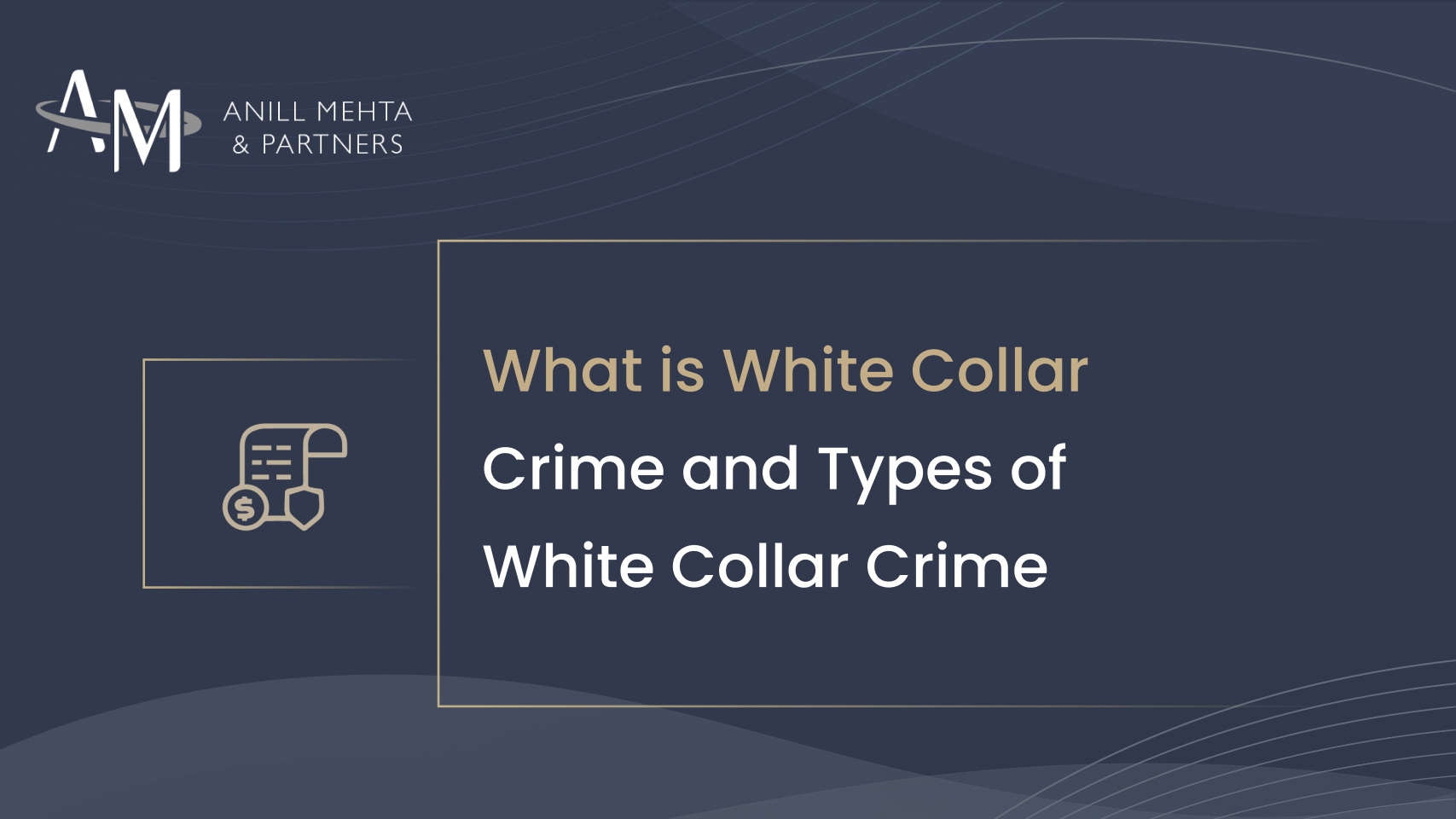White collar crimes are not restricted to boardrooms and backrooms. They have come up as a problem in India’s business, financial, and political sectors. With the digital transactions running high and the financial systems becoming intricate and difficult to understand, it has led to space for advanced frauds to carry out their operations.
Awareness of the types of white collar crime, their legal consequences, and the means of protecting yourself from them is important, especially for professionals, entrepreneurs, and corporations.
This article talks about the idea of what is white collar crime in India, the key laws, the prosecution process, and how AM Partners, with top criminal lawyers in Chandigarh, can assist in such matters.
What is White Collar Crime?
The term “white collar crime” describes financially motivated, non-violent crimes committed by trusted individuals, professionals, or corporate entities. These kinds of crimes are usually committed through deception, fraud, or abuse of power. These are among the types of offenses that usually tend to be complex.
White collar crime was a term coined by sociologist Edwin Sutherland in 1939, and it is now an umbrella term that includes a broad range of acts that harm the economy.
Common Characteristics:
- Involves deceit or concealment.
- Committed for financial gain.
- Non-violent in nature.
- Often conducted by educated individuals in professional settings.
These crimes have the potential to be committed in banks, IT firms, hospitals, government offices, and even startups, where everyone is subject to possible inquiry.
Types of White Collar Crimes in India
Over the past few years, India has witnessed a drastic increase in financial frauds as well as cyber-enabled scams. Some of the frequent types of white collar crimes in the country are:
| Type of White Collar Crime | Description |
|---|---|
| Corporate Fraud | Falsifying company records, misrepresenting financial health, or insider trading. |
| Banking Fraud | Loan frauds, KYC violations, embezzlement, or Ponzi schemes. |
| Cybercrime | Phishing, data theft, hacking, or crypto-related scams. |
| Tax Evasion | Willful misreporting or hiding of income to avoid taxes. |
| Bribery & Corruption | Abuse of public office or private position for illicit gain. |
| Insurance Fraud | Fabricating claims, faking documents, or staging incidents. |
| Money Laundering | Concealing illegally obtained money through legal channels. |
| Forgery | Creating or altering documents for fraudulent advantage. |
Key Laws Governing White Collar Crimes
India has one of the most comprehensive legal frameworks to deal with white collar crimes. The primary laws are:
- Indian Penal Code (IPC), 1860 – Covers cheating (Sec. 415), criminal breach of trust (Sec. 405), forgery (Sec. 463), etc.
- Prevention of Corruption Act, 1988 – Targets corrupt public servants and bribe givers.
- Companies Act, 2013 – Includes provisions for corporate fraud and mismanagement.
- Information Technology Act, 2000 – Governs cybercrime, data breaches, and electronic records.
- Prevention of Money Laundering Act (PMLA), 2002 – Monitors suspicious financial transactions and illegal income sources.
- Income Tax Act, 1961 – Penalizes tax evasion and concealment of income.
- SEBI Act, 1992 – Regulates securities market frauds like insider trading or market manipulation.
How White Collar Crimes Are Investigated and Prosecuted?
Investigation Agencies:
- Central Bureau of Investigation (CBI)
- Enforcement Directorate (ED)
- Serious Fraud Investigation Office (SFIO)
- Economic Offences Wing (EOW)
- Securities and Exchange Board of India (SEBI)
Process of Investigation:
- Filing of FIR or complaint
- Search and seizure of records
- Summons, interrogations, and arrests
- Forensic audit and digital evidence collection
- Charge sheet submission
- Trial in court
Role of a Criminal Lawyer in White Collar Crime Cases
- Pre-FIR legal advice to prevent arrest or legal damage.
- Filing for anticipatory bail or quashing of the FIR.
- Reviewing evidence for inconsistencies or violations.
- Cross-examining expert witnesses during a trial.
- Negotiating settlements or plea bargains.
- Filing appeals if there’s a conviction.
Penalties & Consequences of White Collar Crimes
Legal Penalties:
| Crime | Penalty |
|---|---|
| Fraud (Sec. 447 of the Companies Act) | Up to 10 years imprisonment + Fine up to 3 times the amount involved |
| Cheating (Sec. 420 IPC) | 7 years + Fine |
| Forgery (Sec. 465 IPC) | 2 years + Fine |
| Money Laundering (Sec. 4 of PMLA) | 3–7 years + Fine |
| Tax Evasion (Income Tax Act) | Up to 7 years imprisonment |
Other Consequences:
- Loss of job and reputation.
- Blacklisting of a company/individual.
- Seizure of property and freezing of bank accounts.
- Disqualification from holding public/board positions.
How AM Partners Can Help in White Collar Crime Defense?
- Specialization in financial and economic offenses.
- Experience in representing clients before ED, CBI, EOW, and trial courts.
- Strong understanding of corporate law, IT law, and criminal procedure.
- Strategic pre-litigation advice to avoid criminal liability.
- Personalized attention and client confidentiality.
